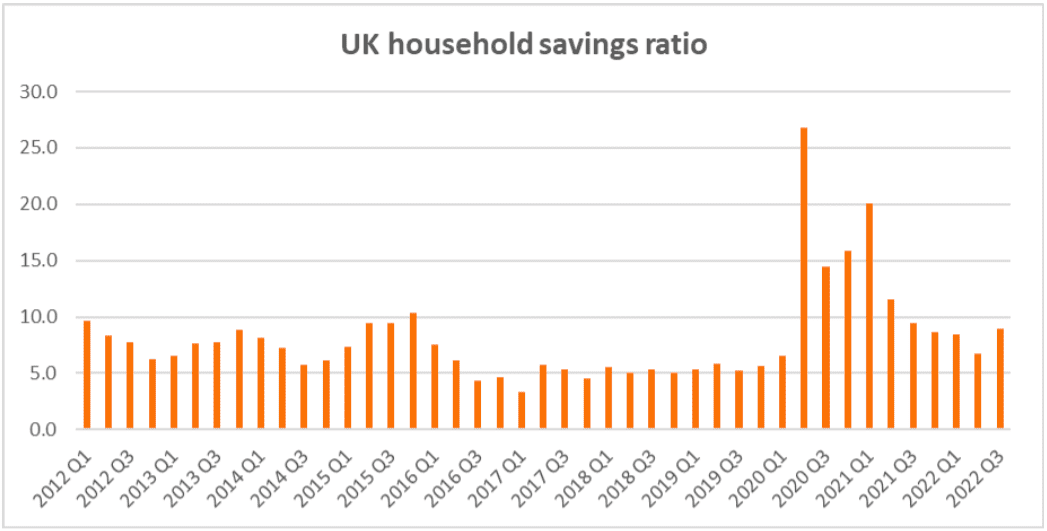Subscribe
Sign up for timely perspectives delivered to your inbox.
Despite a challenging economic environment, Ben Lofthouse, Portfolio Manager of Henderson International Income Trust (HINT), argues that global equities remain one of the best options for income seekers. Here, we look at why HINT’s diversified approach and focus on quality is well placed to deliver reliable income and capital growth to investors.

In today’s uncertain economic environment, it is more difficult than ever to find a fund that can combine reliable, consistent, and competitive income with attractive capital growth. With interest rates likely to remain high for some time, investors will need to diversify their portfolios to find funds that can provide growth and income above stubbornly high rates of inflation. But while it is tempting to look closer to home, the answer may lie further afield where economic growth rates are higher and different sectors and industries can be accessed that can offer that elusive blend of reliable income and capital growth.
While the improved yields on bonds have caught the spotlight – following recent interest rate hikes – investors could still lose out over the long term if inflation remains stubbornly high. We believe that equities are still best equipped to fight this battle, even though the economic headwinds that characterised 2022 remain in place. When growth and investment return expectations are low, global equities have proved themselves time and again to be one of the best options for those seeking a steady income as well as capital growth.
Helping us keep faith with equities for both growth and income is the fact that company finances are in a much stronger position than on the eve of previous downturns, with cash reserves still high after pandemic belt-tightening. The same goes for household finances, with consumers who remain concerned about the economic outlook still sitting on – and indeed growing – their savings. In the UK for example, though the rate at which households have been saving has slowed, data shows that on average, households have not yet had to eat into their savings to pay for the cost-of-living crisis (see chart below). It’s one of the main reasons why retail sales figures around the world have held up against expectations, despite falling real incomes.

Source: Office for National Statistics, 22 December 22 (seasonally adjusted – sa)
Plentiful cash on corporate balance sheets is also one of the main reasons that company dividends are still growing. Rising dividends are an indispensable tool for helping compensate for market volatility and inflation and, as can be gleaned from our most recent Global Dividend Index Report1, the outlook for growth in payouts appears steady. Though dividends are expected to slow from the exceptionally high levels enjoyed in 2022, they are still forecast to rise by 2.3% in 2023 and dividend cover remains high, suggesting confidence in earnings.1
Importantly, there is also attractive value still to be found in equities. Certain parts of the market remain comparative bargains, and we are yet to see the prices of many ‘value’ companies fully catch up after their marked underperformance of ‘growth’ shares in the last decade. Indeed, it could be argued that by receiving attractive dividends, investors are being ‘paid to wait’ until the true value of stocks is realised. These boosted payouts can also be a valuable underpinning for portfolio performance by helping compensate for weaker capital returns when share prices are falling.
So, all in all, equities look still look like a strong bet for generating inflation-beating total returns for some time yet.
A global equity income fund, HINT is a focused portfolio of some of the best income-generating stocks. It boasts an exceptional record in that regard, having grown its dividend every year since inception in 2011.
Underpinning HINT’s success is its harnessing of the power of diversification. Spreading risk broadly across different geographies and industry sectors is key for preserving capital in an uncertain economic environment. As well as helping to smooth out the market’s peaks and troughs by blending assets whose performance is not in lockstep with each other, prudent diversification can enhance long-term returns and buffer against large, damaging drawdowns. For example, those portfolios that were too concentrated in struggling US technology companies last year will have fared appreciably worse than those that which held exposure to foreign companies and value stocks.
And it is not just capital growth that benefits from diversification. It is also an important discipline for income generation as payout rates can be vulnerable if they are concentrated too much in one country or sector.
But effective diversification needs to be more than just diversification for diversification sakes, it needs to give investors access to complimentary return profiles. To this end, HINT is an ideal complement to a balanced portfolio as it only invests in markets outside the UK, thereby eliminating the risk of ‘doubling up’ exposure given UK investors’ typical bias to their home market. What is more, the UK market is fairly concentrated, with dividends dominated by sectors such as oils, miners, pharmaceuticals, and financials. That represents a risk to returns when the economy dips and companies are forced to cut payouts.
HINT also boasts a well-defined investment process that focuses on high-quality companies benefiting from strong pricing power and the ability to pass on rising costs to protect their margins. We believe this emphasis currently gives the trust a tactical advantage in terms of capital growth potential as these companies remain cheap, meaning there is more room to run.
While there are still challenges for 2023, we are optimistic that some of the elements that have weighed on markets and economies in the last year or so – notably the growth slowdown in China and the spike in energy prices – will ease somewhat. Given the prospect that uncertainty will remain high, diversification will nevertheless be key to generating a consistent and stable income. The companies in which you invest will determine how you fare through these difficult market conditions.
HINT, with its inflation-beating dividend growth and compelling diversification advantages, slots perfectly into the portfolio of those investors wishing to maximise the benefits of income-generating equities without sacrificing too much of the potential for capital growth. The time for ‘quality income’ investing is now.
1https://www.janushenderson.com/en-gb/adviser/insights/global-dividend-index/
Balance Sheet – A financial statement that summarises a company’s assets, liabilities and shareholders’ equity at a particular point in time. Each segment gives investors an idea as to what the company owns and owes, as well as the amount invested by shareholders. It is called a balance sheet because of the accounting equation: assets = liabilities + shareholders’ equity.
Volatility – The rate and extent at which the price of a portfolio, security or index, moves up and down. If the price swings up and down with large movements, it has high volatility. If the price moves more slowly and to a lesser extent, it has lower volatility. Higher volatility means the higher the risk of the investment.